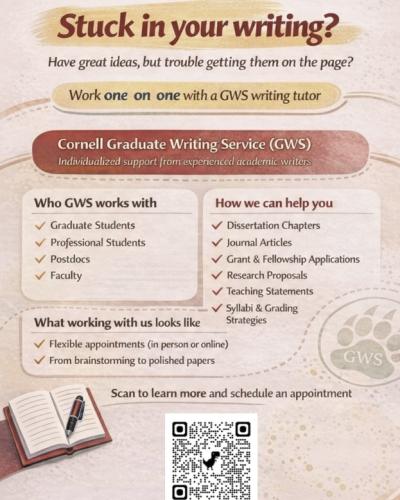Cornell Writes! Tips from our community of writers is a digital newsletter sponsored by the Knight Institute for Writing in the Disciplines and the Cornell University Graduate School.
Each week, a member of our writing community – a Graduate Writing Service, English Language Support Office, or Cornell Writing Centers tutor; a writing specialist from the Knight Institute; a writing instructor from our First-Year Writing Seminars or Writing in the Majors programs; maybe YOU – will share a writing strategy from their own writer’s toolkit. #writelikeabear
Contact Tracy Hamler Carrick with questions and ideas.
Meet Tracy Carrick
Hello Cornell writers! My name is Tracy Carrick. I’m a writing teacher, writing tutor, and director of the Knight Institute’s Writing Workshop and Graduate Writing Service. I am also a writer and editor. Right now, I am drafting course materials and responding to FWS student portfolios.
Here is this week’s Writing Tip!
Let’s talk about “this.”
The activity presented here is not about grammar and mechanics. I do not want to talk about CORRECTNESS. Let’s assume that the sentences that make up your drafts are both grammatically correct and likely effectively written for some audiences.
Instead, I want to talk about:
- STYLE (How can my ProTips help you best capture how the voice in your head is trying to communicate in ways that feel authentic and sincere?)
- CLARITY (How can my ProTips help you identify those passages where you can express your ideas most succinctly and accurately?)
- STRATEGY (How can my ProTips help you think about and write for different readers in ways that are generous and generative?).
So, let’s talk about “this.”
Writers need the word “this.” “This” is a handy word, to be sure. We use it to build momentum as we lace together sentences and reach toward cohesion.
We also use the word "this" to help us get our ideas on paper. “This” can be an excellent placeholder for ideas that are not yet fully formed. Typing “this” can help us push through to the end of the sentence or paragraph or project so that we can keep writing without pausing to say "it" just right or to figure out just what we mean in the first place.
“This,” like many other four-letter words, exists for a reason!
But when line editing my own and others’ drafts, I rarely opt to keep “this” around in final drafts. When we rely too heavily on “this,” we risk circulating writing that is vague, repetitive, and ordinary.
The ProTips presented below are surprisingly simple, but the writers I work with find them remarkably transformative: they will enable you to craft more lively and clear prose, and they can help you identify passages where your own thinking can be refined and presented in ways that are more powerful, inclusive, and unique.
LET'S GET THIS STARTED!
Use the Find & Replace feature to search your draft for the word “this” (Control-F or Command-F). Note how many occurrences you see, and then scroll through the document to note areas with concentrated use.
I commented recently on a 1500-word draft. By my count, the writer used “this” 19 times in 76 sentences!
If you do not have a “this” habit, skip to ProTip #5. But if you are a “this” enthusiast like me, toggle through your draft and run each instance of “this” through ProTips #1, #2, #3, and #4.
ProTip #1 | Avoid unspecified occurrences of “this”
"This" is vague. Consider this passage:
"...this produces an immense yield of produce at a cheaper rate for consumers…"
"This" what?
If you do not clarify what “this” means,” readers may pause to look back in an attempt to see what “this” refers to (which could disrupt comprehension). More likely, though, readers will keep their eyes moving forward and may either attempt to fill in a fuzzy reference with their own ideas (which could be inaccurate) or keep reading without a clear sense of what they have read (which could cause confusion, frustration, or disinterest).
ProTip #2 | Embrace the opportunities that “this” creates
"This" is a missed opportunity. Consider this revision:
"Although this system produces an immense yield of produce at a cheaper rate for consumers...."
The writer here followed ProTip #1 and added the word, “system.” Better.
But why not further develop the revision so as to steer readers toward the argument about the system?
Consider any or all of these revision possibilities:
"Although this corrupted/antagonistic/short-sighted/profit-driven system produces an immense yield of produce at a cheaper rate for consumers, it does not consider nutritional quality, environmental degradation, or the impact on industry workers.”
ProTip #3 | Vary sentence structure
"This" is repetitive.
Remember that draft I wrote about above, the one that used “this” 19 times in 76 sentences? In some paragraphs, the word “this” appeared as many as 5 times, and in most cases, the word “this” was the first word of the sentence.
Most writers would look at a paragraph that includes 5 sentences that begin the same way and set a goal to revise. For some reason though many writers I know are not similarly motivated when “this” sentences repeat. Perhaps they do not see them in the same way, or perhaps they do not see them at all. The Find & Replace strategy makes “this” differently visible.
Why not take the opportunity to reach further with your “this”-prompted revision to explore how you might rewrite the sentence structure all together?
ProTip #4 | Clarify thinking
“This” is often used as a placeholder.
When I see or write a passage with a high concentration of the word ”this,” I suspect that the writer is struggling with much more than the writing.
If rewriting your “this” sentences using the revision strategies proposed above does not come easy, you may need to spend time doing some figuring out. What ideas are you reaching for? What work are you trying to get on the page?
I recommend taking a moment to leave your draft. Open a new document or pull out a notebook so you can do some freewriting. Or schedule an appointment with a tutor or call a friend to brainstorm and talk it out.
ProTip #5 | Find & Replace other words and phrases
While you are at it, use the Find & Replace strategy to locate other troublespots or missed opportunities. I recommend searching for "these,” "it,” and "however” as they are common among writers I know.
I also recommend taking note of your personal patterns of repetition and the words and phrases that you over rely on.
- Do you use certain words/phrases too much?
- Do you use them differently in different parts of the same writing project?
- Do you use them differently than others writing about similar things?





